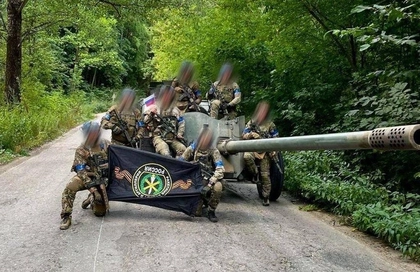Ukrainian forces struck a Russian S-300 anti-aircraft missile complex near Novoshakhtinsk in Russia’s Rostov region early on Wednesday, Aug. 21, according to the General Staff of the Armed Forces of Ukraine (AFU).
The attack was carried out by units of the Ukraine’s Naval Forces in coordination with other components of the Defense Forces. Explosions were recorded at the target sites, but the accuracy and extent of the damagewas still being investigated, according to the report.
JOIN US ON TELEGRAM
Follow our coverage of the war on the @Kyivpost_official.
“The joint combat efforts of all components of Ukraine’s Defense Forces on critical Russian military targets continue. More strikes will follow,” the statement read.
The S-300, a Soviet-era medium-range anti-aircraft missile system, is designed to counter strategic and tactical aircraft, cruise missiles, and ballistic missiles at altitudes ranging from 25 meters (80 feet) to 27 kilometers (17 miles), with a range of up to 100 kilometers (62 miles). The system is said to be resistant to electronic countermeasures.
When deployed in groups, S-300 systems can effectively defend large areas from airborne threats, making them one of Russia's most formidable anti-aircraft systems.
Russian forces frequently use S-300 systems not only for air defense but also to strike Ukrainian cities, often leading to the destruction of residential buildings and civilian casualties.
Despite their capabilities, S-300 systems are vulnerable to high-precision missiles, drones, and other modern weapons. Although the S-300's range is extensive, it may be insufficient to intercept missiles launched from long distances.

Why Did Usyk Brandish Mazepa’s Sword After Winning
In mid-July, the AFU Commander-in-Chief Oleksandr Syrsky announced a successful strike on a Russian S-300 missile system near Mariupol in the occupied Donetsk region.
According to the military news outlet Militarnyi, Ukrainian forces fired at least four M39 cluster-munition filled ATACMS missiles at Russian anti-aircraft positions on the outskirts of Mariupol.
“The damage to enemy radar stations and launchers has been confirmed based on intelligence reports,” Syrsky said, adding that further details about the strike's impact are still being assessed.
You can also highlight the text and press Ctrl + Enter






